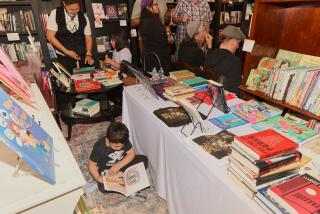The year in books: David L. Ulin
About a month ago, I had a couple of conversations about publishing and bookselling that seemed to fly in the face of convention — if, by convention, you mean the idea that publishing and bookselling are doomed. The first was with Steve Crist, publisher of the Santa Barbara-based press Ammo Books, which recently released “Edward Weston: One Hundred Twenty-Five Photographs,” a retrospective with text from Weston’s notebooks. The second was with Maryelizabeth Hart, co-owner of San Diego’s Mysterious Galaxy Bookstore, which opened a satellite branch in Redondo Beach this fall.
Both were upbeat, if also realistic, about a landscape fraught with challenges but maybe equally with possibility. “The present for booksellers is challenging,” Hart acknowledged by email, after I followed up on our discussion, “as it is for many retailers because of the economy, but also because of the uncertainties in the industry as a whole.” At the same time, “there are some factors that point to this being a good time to be pursuing this endeavor. Most significant is the growing cultural consciousness of the value in buying local and/or buying independent.”
Sound like a call to arms? Perhaps. But here’s the thing: I agree. Earlier this month, Amazon.com provoked an uproar when it released what the American Library Assn. calls “a price-check app that allows shoppers to browse Main Street stores … scan a product, ask for expertise, and walk out empty-handed in order to buy on Amazon”: the very model of a predatory strategy.
Stores such as Mysterious Galaxy stand in direct opposition to these practices, seeking to function more responsibly. The same is true of Ammo, which, notes Crist, is “intentionally keeping itself ‘boutique’ so we are not paying for costs that other publishers find so commonplace … [while] creating ‘hand-crafted, one-of-a-kind books.’”
What appeals to me about Ammo and Mysterious Galaxy is the story they tell about a book industry that’s bigger and more diverse than the one imagined by Amazon. And why not? If 2010 was the year e-reading finally carved out a place for itself, then 2011, perhaps, is the year we began to think about how traditional and new media models not only can, but must, coexist.
No knock on digital, but there are some things — art books, the hand-selling of an independent bookseller — you can’t appreciate by way of a screen. “Some of our books can work on that platform,” Crist says, “but most of our big books people want to see, hold and touch.”
As to how this works, I think it all goes back to Hart’s idea of independence, that people want something more authentic, with a human touch. You can see it throughout the culture: in the tenacity of the Occupy movement, in the distrust of corporations, in the desire to be part of a community, digital or otherwise. When, Hart explains, her partner Terry Gilman moved from San Diego to the South Bay, “she started fostering a community … launching the very successful Ladies, Lunch, and Literacy program to introduce new authors to readers and support nonprofit organizations.” That program, in turn, helped create an atmosphere that led to the new store.
What all this suggests is that, when it comes to publishing and bookselling, we’re dealing with a complex landscape in which we have no choice but to readjust our expectations as we go along. And yet, the constant is, as it has always been, passion: the passion to produce the books we want and get them into the hands of a sympathetic readership.
Ammo is a case in point. In its six years of operation, it has grown into a press that produces about a dozen new titles — art and design books, as well as a line of children’s picture books and puzzles by such artists as Charley Harper and Patrick Hruby — every year. The genesis, however, remains wholly personal.
“I was collaborating closely with Hunter S. Thompson,” Crist recalls, “and … [after his memorial service], I went back to the hotel room in Aspen and sent a late-night email to resign from my publishing ‘day job.’ … It sounds crazy but I really kind of could hear his voice, pushing me to jump and do it.... ‘I see a great future for you and I in publishing, Steve....’”
As to what that means, I don’t know; the landscape remains too volatile. But if Ammo and Mysterious Galaxy have a lesson to offer, it is to follow your heart. The book business has always been tenuous, as are all industries that revolve, in one way or another, around the arts. For me, then, 2011 is a year to remember this — and to remember also that it’s commitment that matters, in literature as in life.
More to Read
Sign up for our Book Club newsletter
Get the latest news, events and more from the Los Angeles Times Book Club, and help us get L.A. reading and talking.
You may occasionally receive promotional content from the Los Angeles Times.









